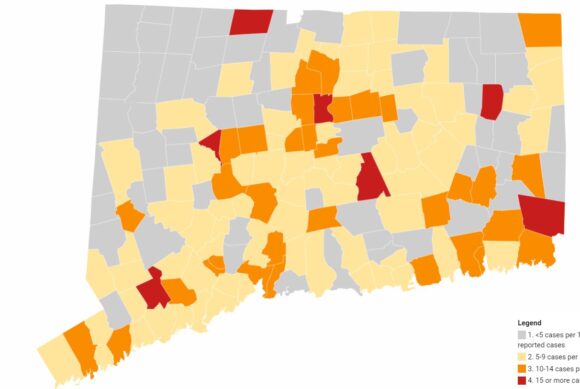
LYME/OLD LYME — The Daily Data Report for Connecticut issued Thursday, Aug. 5, by the Connecticut Department of Public Health (CT-DPH) for data as at 8:30 p.m. Wednesday, Aug. 4, shows the latest average daily rate of new cases of COVID-19 by town during the past two weeks (see map above.)
The picture is worrying and reflects national trends with substantial increases in the number of towns in each zone, except Gray (the lowest case rate zone.) These increases are due primarily to the increased virulence of the Delta Variant.
Six towns are now in the Red (highest case rate) Zone (last week’s number was four) and 33 in the Orange (second highest case rate) Zone — last week’s number was four. See detailed description of the zones in italics below.
The towns in the Red Zone are East Hampton, Easton, Hampton, Hartford, Hartland, North Stonington*, and Thomaston.
There are 33 towns in the Orange Zone including Old Lyme, Waterford, New London, Groton, Ledyard and Stonington, all of which are in the Ledge Light Health District, as are the towns denoted with an * in the other zones.
East Lyme* has reentered the Yellow (second lowest) Zone along with more than 50 other Connecticut towns.
All remaining towns in the state, including Lyme*, are in the Gray (lowest rate) Zone. This is the 20th straight week that Lyme is in the Gray Zone.
New Cases in Both Towns
The Daily Data Report issued Friday, Aug.6, shows that Old Lyme has reported two new confirmed COVID-19 cases since our last report on Aug. 2 . This takes Old Lyme’s cumulative total of confirmed cases to 356, while Lyme has had one new case taking their total to 113.
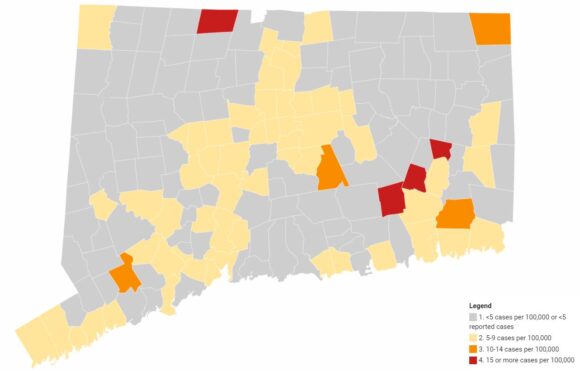
- The Gray category is defined as when the Average Daily Rate of COVID-19 Cases Among Persons Living in Community Settings per 100,000 Population By Town is less than five or less than five reported cases.
- The Yellow category is defined as when the Average Daily Rate of COVID-19 Cases Among Persons Living in Community Settings per 100,000 Population By Town is between five and nine reported cases.
- The Orange category is defined as when the Average Daily Rate of COVID-19 Cases Among Persons Living in Community Settings per 100,000 Population By Town is between 10 and 14.
- The Red category is defined as when the Average Daily Rate of COVID-19 Cases Among Persons Living in Community Settings per 100,000 Population By Town exceeds 15.
- In all cases, this rate does not include cases or tests among residents of nursing home, assisted living, or correctional facilities.
The following maps show has the picture of COVID-19 cases has gone from an almost totally red map back in Dec. 2020 to an almost all-gray map on June 17, 2021 and then back to a map with all colors represented in substantial number again.
Stephen Mansfield prefaced the LLHD report sent out yesterday with these words, “We are seeing a significant uptick in new cases, as well as outbreaks associated with family gatherings and other social events.”
He added, “Although we are making great strides with our COVID vaccination program, it is imperative that we remain diligent in our mitigation strategies. We strongly advise everyone to wear masks indoors in public settings, regardless of vaccination status”
The map below is from July 22, when two towns, Franklin and Salem, were in the Red Zone (indicating the highest rate of COVID-19 new cases), which is up one from the previous week, and Andover remained in the (second highest rate) Orange Zone (down from two towns last week.)
Eight towns were in the Yellow Zone (indicating the lowest but one rate of COVID-19 new cases), which is up from two last week. They were Clinton, East Hampton, Manchester, Newington, Stonington, Westbrook, Windsor and Windsor Locks.
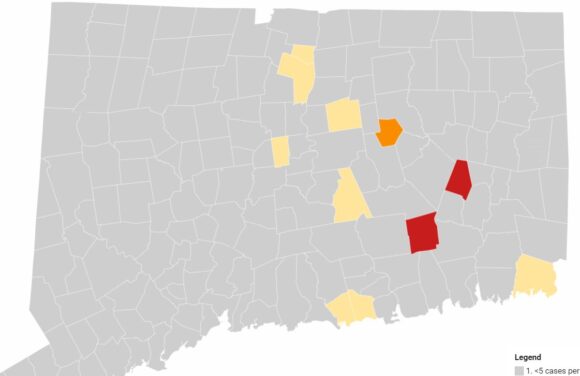
The map below is from July 15, when one town, Franklin, was in the Red Zone (indicating the highest rate of COVID-19 new cases) and another two, Salem and Andover, were in the (second highest rate) Orange Zone. New Hartford and Griswold were in the Yellow Zone (indicating the lowest but one rate of COVID-19 new cases.)
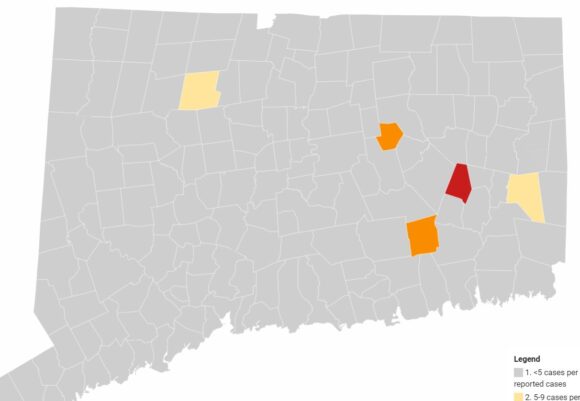
The map below is from July 8, when New Hartford was the sole town in the Yellow Zone.
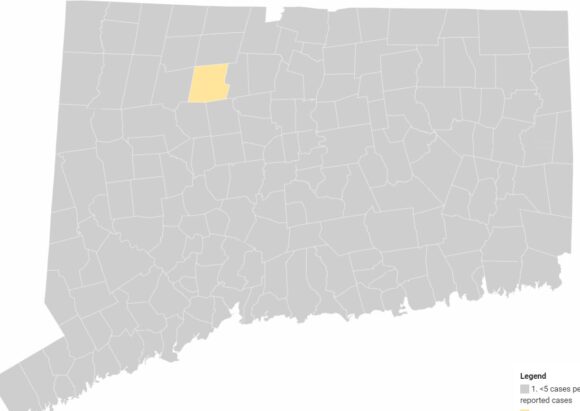
The map below is from July 1, when Marlborough and Prospect were in the Yellow Zone.
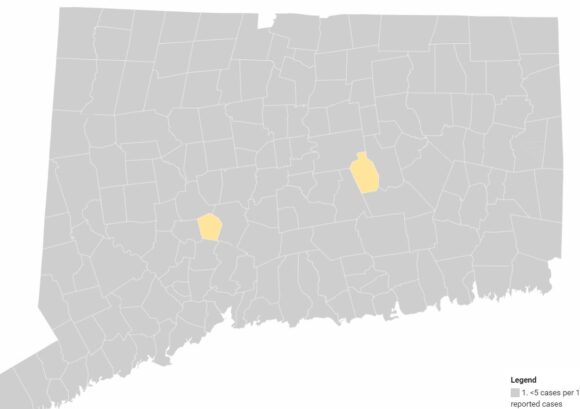
The map below is from June 24, when Somers, Prospect and Bolton were in the Yellow Zone.
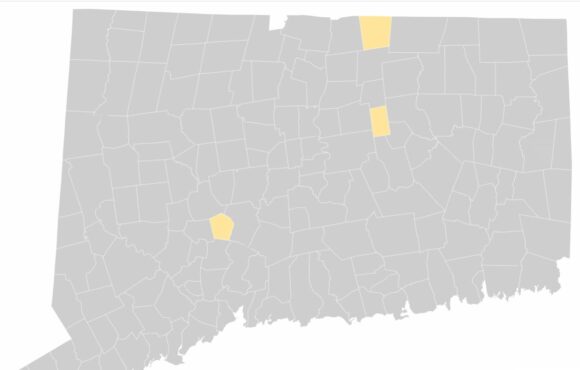
This is the June 17 map, when just one town, Bolton, was in the Yellow Zone.
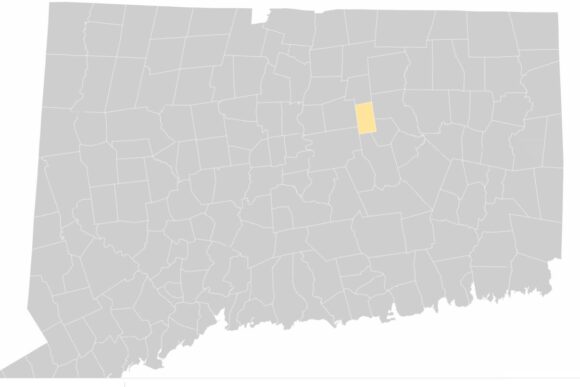
For comparison, the map below is from June 3 and shows one town, Waterbury, in the Orange Zone and 21 towns in the Yellow Zone, down from 48 the previous week. The towns in the Yellow Zone were: Ansonia, Beacon Falls, Bloomfield, Brooklyn, Coventry, Cromwell, Derby, East Hartford, East Haven, Granby, Hamden, Hartford, Manchester, New Britain, New Haven, New London, Putnam, Rocky Hill, Shelton, Waterford and Windsor.
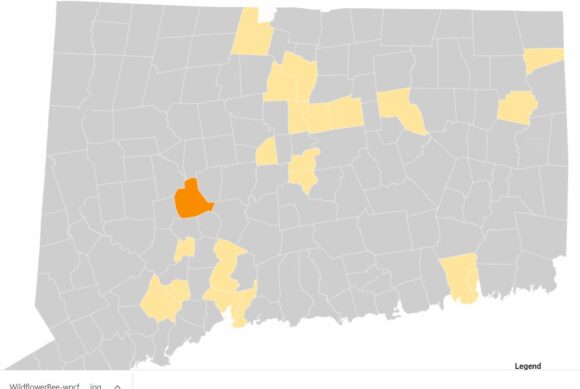
Below is the map from May 27 that showed one town in the Red Zone, Putnam, and 10 towns in the Orange Zone.
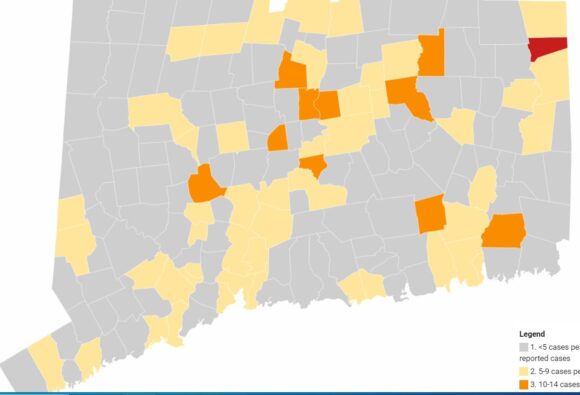
Compare the maps above with the one we published Dec. 18, 2020 to see the remarkable progress that has been made with controlling the spread of the virus through expansion of vaccination rates and improved mitigation strategies.
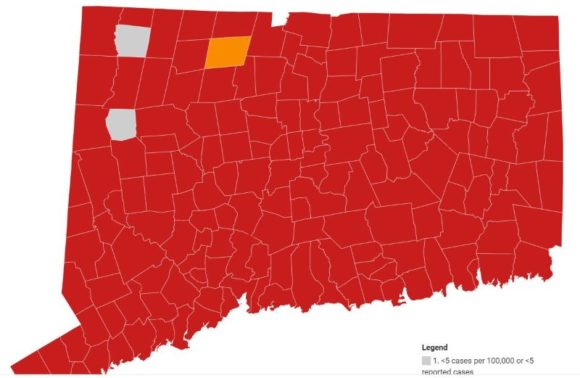
Vaccination rates in Lyme and Old Lyme are encouraging with 82.8 percent of the population in Lyme having received at least one dose of the COVID-19 vaccine and the equivalent number for Old Lyme being 74.5. percent.
Percentages for the fully vaccinated are 79.5 for Lyme and 71.1 for Old Lyme.
These rates remain among the higher percentages in the state.
Information regarding vaccination opportunities and other relevant information can be found at https://llhd.org/coronavirus-covid-19-situation/covid-19-vaccine/
The following link provides centralized access to Connecticut COVID data: https://data.ct.gov/stories/s/COVID-19-data/wa3g-tfvc/